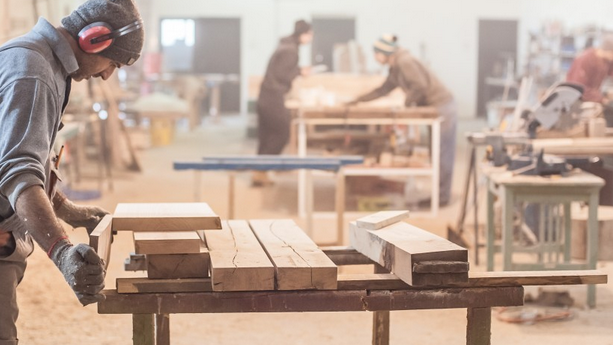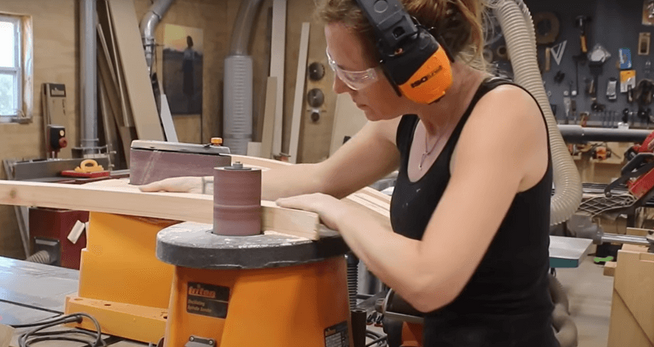In a fast-paced world, the therapeutic benefits of woodworking are gaining recognition. Woodworking therapy, a creative and hands-on approach to mental well-being, harnesses the power of craftsmanship to heal and nurture the mind. Let’s delve into this unique form of therapy and explore how it promotes emotional balance, mindfulness, and personal growth.

The Therapeutic Essence of Woodworking
Woodworking therapy embraces the therapeutic essence of crafting with one’s hands. Through the rhythmic process of carving, shaping, and assembling wood, individuals find solace in the tactile connection between their thoughts and creations.
Fostering Mindfulness and Presence
According to the cliquez ici experts, engaging in woodworking demands complete attention. The focus required to measure, cut, and assemble wood pieces immerses individuals in the present moment. This mindfulness practice reduces anxiety and promotes relaxation.
Empowering Through Achievement
Accomplishing woodworking projects, whether big or small, provides a sense of achievement. This feeling of mastery boosts self-esteem and encourages individuals to tackle challenges in other aspects of life.
Coping Mechanism for Stress
Woodworking serves as a healthy coping mechanism for stress. The physical act of working with wood and the tangible progress made during each session offers a reprieve from daily pressures.
Creativity as an Outlet
Woodworking therapy encourages creative expression. Carving, sculpting, and designing projects allow individuals to express their emotions and ideas in a tangible and constructive way.
Fostering Patience
Working with wood teaches patience. It requires waiting for the glue to dry, making precise measurements, and fine-tuning details. These experiences translate into improved patience in daily life.
A Journey of Self-Discovery
Woodworking therapy is a journey of self-discovery. As individuals create, they often unearth hidden talents and gain insights into their preferences, strengths, and areas for growth.
Sense of Purpose
Engaging in woodworking therapy provides a sense of purpose. The act of crafting with intention and creating something tangible reaffirms one’s ability to contribute positively to the world.
Social Connection Through Workshops
Woodworking workshops and group sessions foster social connection. Sharing experiences, ideas, and finished projects with like-minded individuals creates a sense of belonging.
Empowering Vulnerability
Woodworking therapy encourages individuals to embrace vulnerability.
A Holistic Approach to Mental Health
Woodworking therapy complements traditional therapeutic approaches. It offers a holistic perspective on mental well-being by incorporating physical activity, creativity, and mindfulness.
Accessible to All Ages
One of the beauties of woodworking therapy is its accessibility.
Healing Through Repetition
Repetitive woodworking tasks can be meditative. Sanding, for example, involves rhythmic motions that calm the mind and reduce stress.
Reducing Screen Time
Woodworking therapy offers a welcome break from screen time. Disconnecting from digital devices and engaging with physical materials can reduce the negative effects of technology on mental health.
Nurturing Resilience
Woodworking fosters resilience. Overcoming challenges, whether in the form of a difficult joint or an unexpected design flaw, reinforces the idea that setbacks are part of the creative process.
Creating a Personal Sanctuary
Crafting woodworking projects can lead to the creation of personal sanctuaries. Whether it’s a cozy corner with handcrafted furniture or a garden filled with wooden sculptures, these spaces become sources of comfort and serenity.
Embracing Imperfections
Woodworking therapy encourages acceptance of imperfections. Every knot, blemish, or uneven cut becomes part of the story and beauty of the piece.
A Therapeutic Journey of Self-Care
Woodworking therapy invites individuals to embark on a therapeutic journey of self-care. It is a reminder that dedicating time to personal well-being is an essential part of life.
Conclusion
Woodworking therapy, with its emphasis on mindfulness, creativity, and self-expression, is a therapeutic journey of self-discovery and mental well-being. It empowers individuals to embrace vulnerability, foster resilience, and find solace in the act of creation. As a holistic approach to mental health, therapy offers a unique path to healing, reminding us all that the act of crafting can carve out a space for mental well-being in our lives.


